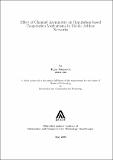| dc.contributor.advisor | Srivastava, Sanjay | |
| dc.contributor.author | Vasavada, Tejas | |
| dc.date.accessioned | 2017-06-10T14:37:28Z | |
| dc.date.available | 2017-06-10T14:37:28Z | |
| dc.date.issued | 2008 | |
| dc.identifier.citation | Vasavada, Tejas (2008). Effect of channel asymmetry on reputation based cooperation mechanisms in mobile ad-hoc networks. Dhirubhai Ambani Institute of Information and Communication Technology, viii, 52 p. (Acc.No: T00163) | |
| dc.identifier.uri | http://drsr.daiict.ac.in/handle/123456789/200 | |
| dc.description.abstract | Enforced cooperation among MANET nodes is an active research issue. In applications, where the users have different goals and there is no central authority to control them, users may become selfish. These nodes may not forward packets sent by others and thus affect the basic functionality of the network.
One proposed class of protocols to handle such scenarios is based on reputation functions. In reputation based schemes, nodes maintain reputation values of other nodes. Reputation value of a node is high for nodes that forward the received packets and low otherwise. Nodes with very low reputation values are identified as selfish nodes and isolated from network operations.
In such schemes, every node has to observe whether its neighbour is forwarding packets or not. A node after sending a packet to its neighbour to forward further, increases reputation of neighbour if it overhears the same packet from the neighbour. If it does not overhear the packet, reputation of neighbour is reduced. This is the basic method to observe whether neighbour node is cooperative or not. Here basic assumption is that the channel between two neighbour nodes is always symmetric. This assumption does not hold true due to two reasons: (1) Nodes are moving. Neighbour node may have forwarded the packet but by the time it forwards, either observing node or neighbour or both might move out of each others range. (2) Even if both are in each others range, due to multipath fading, observing node may not overhear the packets forwarded by neighbour node. Thus sometimes even honest nodes may be considered selfish and isolated due to this asymmetry. This reduces throughput of honest nodes.
In this thesis work we have examined the probability of channel asymmetry as a function of ratio r(of inter node distance and transmission range), for given values of relative average velocity of nodes V and Ricean parameter K. Ricean parameter K represents type of the environment i.e. obstructed or unobstructed. We have proposed an enhancement of existing reputation protocol OCEAN. In the enhanced protocol, observing node probabilistically updates reputation of neighbour when it does not overhear. This probabilistic update takes into account probability of channel asymmetry. We have tried to minimize false positives, i.e. honest nodes being detected as selfish. We have shown through simulations that false negatives, i.e. selfish nodes being detected as honest, do not increase much. We have also shown that how false positives and false negatives change as degree of dishonesty of selfish nodes change. At last, we have shown that throughput levels of honest nodes in original OCEAN protocol and modified OCEAN protocol are almost same. | |
| dc.publisher | Dhirubhai Ambani Institute of Information and Communication Technology | |
| dc.subject | Peer-to-peer architecture | |
| dc.subject | Computer network architectures | |
| dc.subject | Cryptography | |
| dc.subject | Computer security | |
| dc.subject | Signal processing | |
| dc.subject | Digital techniques | |
| dc.subject | Radio | |
| dc.subject | Transmitters and transmission | |
| dc.subject | Fading | |
| dc.subject | Modulators | |
| dc.subject | Electronics digital communications | |
| dc.subject | Mobile communication systems | |
| dc.classification.ddc | 621.38216 VAS | |
| dc.title | Effect of channel asymmetry on reputation based cooperation mechanisms in mobile ad-hoc networks | |
| dc.type | Dissertation | |
| dc.degree | M. Tech | |
| dc.student.id | 200611026 | |
| dc.accession.number | T00163 | |

